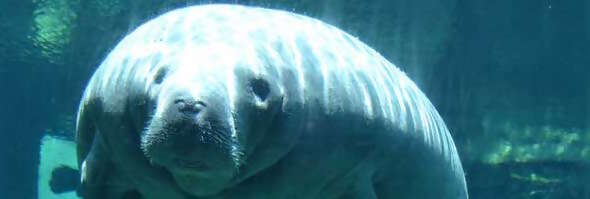SAVING THE MERMAIDS OF FLORIDA
Posted on 08/31/2016

In 1493 Christopher Columbus recorded seeing "mermaids" off the prow of his ship. He described them as “not so beautiful as they are said to be, for their faces had some masculine traits." They were not in fact the half-woman half-fish creatures of mythical legend, but a distant cousin of the elephant. Today concerted efforts are being made to save the manatees from facing extinction.
Manatees, also known as sea cows have been around for 45 million years.
In the 19th century manatees were hunted for their meat, fat and hides, yet sinking population numbers from the last few decades have been attributed to collisions with motorboats.
The large beasts also suffer entanglement in monofilament lines or crab traps. Exposure to cold water causes legions on their bodies, so Florida manatees spend a lot of time in power plant discharge basins to seek warmer water. It is feared that they pick up infections from there.
The Florida Fish and Wildlife Commission (FWC) biologists are responsible for coordinating rescues of sick and injured manatees and transporting them to rehabilitation facilities.
SeaWorld Orlando is part of that effort. Pedro Ramos is a rescue programme supervisor at SeaWorld, and a member of the team that responds when SeaWorld is called upon to save a manatee in distress.
Injured sea cows, once assessed and weighed by the SeaWorld vet are taken to a rescue pool, one of which has a false bottom for staff to raise and lower for easier access and care of the animals.
This area has recently been open to the public, but it is a hospital zone and staff members disallow people from sitting on, or leaning over the pool edge, or resting items on it.
On the day of our visit, SeaWorld was treating a mother manatee that had been hit by a boat and suffered from pneumothorax, a condition where a body cavity fills with air causing it to be unable to stay submerged. SeaWorld performed a “chest tap” to relieve the animal of the built up pressure and air. Her baby shared the medical pool at SeaWorld with her, as did some other patients.
The medical status of the manatees is reported back to FWC. They decide when the animal will stay for longer medical attention at SeaWorld or go back to the waterways.
Some retire at SeaWorld, said Ramos, “Animals rescued three times cannot be released in the wild. And manatees that have been in critical care for too long won’t be able to adapt to their natural environment.”
The radical decline in the manatee population resulted in it now being illegal to harass, hunt, capture or kill them in the United States. The numbers are recovering but injuries continue to occur.
The mermaid of ancient mythology was often associated with shipwrecks and drowning sailors, supposedly responsible for trauma at sea. Unfortunately today, for Florida’s mermaid, the West Indian manatee the trauma is usually its own.
